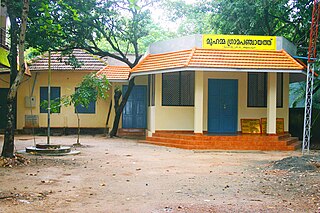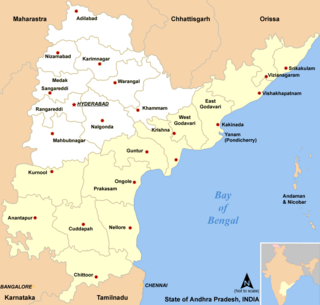
Andhra Pradesh is a state in the southern coastal region of India. It is the seventh-largest state with an area of 162,970 km2 (62,920 sq mi) and the tenth-most populous state with 49,577,103 inhabitants. It has shared borders with Chhattisgarh, Odisha, Karnataka, Tamil Nadu, Telangana and the Bay of Bengal. It has the second-longest coastline in India at about 974 km (605 mi). After existence as Andhra State and unified Andhra Pradesh, the state took its present form on 2 June 2014, when the new state of Telangana was formed through bifurcation. Amaravati is the capital of the state, with the largest city being Visakhapatnam. Water sharing disputes and asset division with Telangana are not yet resolved. Telugu, one of the classical languages of India used by the majority of people, is the first official language.

Dalit, also some of them previously known as untouchables, is the lowest stratum of the castes in the Indian subcontinent. Dalits were excluded from the four-fold varna of the caste hierarchy and were seen as forming a fifth varna, also known by the name of Panchama. Several scholars have drawn parallels between Dalits and the Burakumin of Japan, the Baekjeong of Korea, the Hukou system of China and the peasant class of the medieval European Feudal system.
The Other Backward Class (OBC) is a collective term used by the Government of India to classify castes that are educationally or socially backward. It is one of several official classifications of the population of India, along with general castes, Scheduled Castes and Scheduled Tribes (SCs and STs). The OBCs were found to comprise 52% of the country's population by the Mandal Commission report of 1980 and were determined to be 41% in 2006 when the National Sample Survey Organisation took place. There is substantial debate over the exact number of OBCs in India; it is generally estimated to be sizable, but many believe that it is higher than the figures quoted by either the Mandal Commission or the National Sample Survey.

The Scheduled Castes and Scheduled Tribes are officially designated groups of people and among the most disadvantaged socio-economic groups in India. The terms are recognized in the Constitution of India and the groups are designated in one or other of the categories. For much of the period of British rule in the Indian subcontinent, they were known as the Depressed Classes.

Madiga is a Telugu caste from southern India. Madiga Known As Matang or Mang In Maharashtra State.They mainly live in the states of Andhra Pradesh, Telangana and Karnataka, with a small minority in Tamil Nadu. Madigas are historically associated with the work of tannery, leatherwork and small handicrafts. Today, most are agricultural labourers. They are categorized as a Scheduled Caste by the Government of India. Within the Madiga community, there are various sub-castes include Bindla, Chindu, Dakkali and Mashti. Madigas have their own classes, the priestly class is known as Madiga Dasari. The Sangaris, Thothis, etc. have different works for their community.

The constitutional power to create new states and union territories in India is solely reserved with the Parliament of India, which can do so by announcing new states/union territories, separating territory from an existing state or merging two or more states/union territories or parts of them. As of 2024, there are 28 states and eight union territories in India.
Reservation is a system of affirmative action in India created during the British rule. It provides historically disadvantaged groups representation in education, employment, government schemes, scholarships and politics. Based on provisions in the Indian Constitution, it allows the Union Government and the States and Territories of India to set reserved quotas or seats, at particular percentage in Education Admissions, Employments, Political Bodies, Promotions, etc., for "socially and educationally backward citizens."

Panchayati raj is the system of local self-government of villages in rural India as opposed to urban and suburban municipalities.
The Scheduled Castes and the Scheduled Tribes Act, 1989 was enacted by the Parliament of India to prevent atrocities and hate crimes against the scheduled castes and scheduled tribes. The Act is popularly known as the SC/ST Act, PoA, or simply the 'Atrocities Act'.
Creamy layer is a term used in Indian politics to refer to some members of a backward class who are highly advanced socially as well as economically and educationally. They constitute the forward section of that particular backward class – as forward as any other forward class member. They are not eligible for government-sponsored educational and professional benefit programs. The term was introduced by the Sattanathan Commission in 1971, which directed that the "creamy layer" should be excluded from the reservations (quotas) of civil posts. It was also identified later by Justice Ram Nandan Committee in 1993.
Tiruvuru is a town in NTR district of the Indian state of Andhra Pradesh. It is a Municipality in Tiruvuru mandal of Tiruvuru revenue division.
In India, a number of political positions and university posts are held for specific groups of the population, including Scheduled Castes and Scheduled Tribes, and women in some cases.

Manda Krishna Madiga, born as Yellaiah on July 7, 1965, is a prominent Indian politician and activist known for his unwavering commitment to the rights of the marginalized Madiga community. His journey from early anti-caste activism in the 1980s to founding the Madiga Reservation Porata Samiti in 1994 and adding the Madiga surname has been marked by advocacy efforts spanning issues such as caste discrimination, children's health, and disability rights.

Srikrishna Committee on Telangana or the Committee for Consultations on the Situation in Andhra Pradesh (CCSAP) is a committee headed by Justice B. N. Srikrishna to look into the demand for separate statehood for Telangana or keep the State united in the present form, Andhra Pradesh. The committee was constituted by the Government of India on 3 February 2010 and submitted its report on 30 December 2010 to the Ministry of Home Affairs.
Pothula Vigneswara Rao spearheaded the Dalit Mala Mahanadu movement in Andhra Pradesh to fight against the categorisation of Scheduled Castes into A, B, C, D groups.

Adilabad district is a district located in the northern region of Telangana, India. It is known as the gateway district to South and Central India. The town of Adilabad is its headquarters. The district shares boundaries with Asifabad, Nirmal districts and with the state boundary of Maharashtra.

Nuthalapati Venkata Ramana is a former Indian judge and journalist who served as the 48th Chief Justice of India.
The 2019–2024 Amaravati protests, simply known as Amaravati protests, are ongoing demonstrations in the Indian state of Andhra Pradesh triggered by the idea of changing the one capital of Amaravati already identified and developed partially, to three capitals of Amaravati, Visakhapatnam and Kurnool by the Government of Andhra Pradesh. This led to concerns that the decision would create chaos and insecurity for farmers who gave their fertile agricultural lands to the government in 29 villages of Guntur and Krishna districts. The protests began in Mandadam, Thullur, Uddandarayunipalem on 18 December 2019. In a few days, the protests spread across Andhra Pradesh Capital Region, in Andhra Pradesh. On 17 December 2020, series of events were done to mark the protests' anniversary.








